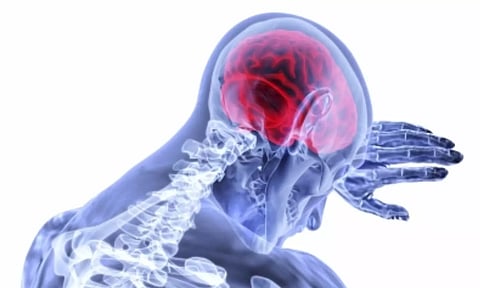

HYDERABAD: Introduction of revolutionary rapid Artificial Intelligence (AI) technology is extending the treatment window for ischemic stroke patients from the traditional 'golden hour' to the 'golden day'.
According to neurologists, rapid AI works by integrating with advanced imaging techniques like MRI and CT scans.
The AI software analyses brain images, distinguishing between two critical regions: the "core", which represents severely damaged brain tissue, and the "penumbra", the at-risk area that's still salvageable.
Rapid AI provides clear visualisations of these areas, enabling medical professionals to make informed treatment decisions. Ushering in a new era of stroke care, KIMS Hospitals in Hyderabad introduced the AI technology offering hope and help to individuals affected by this debilitating condition.
“Ischemic strokes, which account for approximately 80 per cent of all strokes, occur when a blood vessel in the brain becomes blocked, depriving the brain of crucial oxygen. Until now, thrombolytic agents, which can dissolve these clots, are only effective within the first 4.5 hours. Beyond this timeframe, the treatment's effectiveness decreases, and it may even lead to adverse effects. The latest research and technology has made it possible to mechanically remove the brain clot for up to 24 hours. However this needs proper selection of patients based on the assessment of already damaged brain tissue and the still undamaged but at risk brain tissue,” said Dr Subhash Kaul, senior Neurologist, KIMS Hospitals.
The traditional approach involved assessing the extent of brain damage by looking at CT and MRI brain with naked eye. However, this method is often imprecise, as stroke damage can affect scattered regions of the brain rather than one region.
To address this limitation, KIMS Hospitals has adopted the Rapid AI software, originally developed and tested in the US. This software, integrated with MRI technology, accurately calculates the core and penumbra areas of the brain, providing a comprehensive and precise assessment that enables doctors to perform mechanical thrombectomy, effectively removing the blockage.
“KIMS Hospitals, in a pioneering move for the region, now offers hope to stroke patients who can seek treatment within the extended "Golden Day," which encompasses the first 24 hours following the stroke. Rapid AI has huge potential to transform stroke care in Telangana and Andhra Pradesh,” said Dr Manas Panigrahi, HOD and senior Consultant Neurosurgery, KIMS Hospitals.
Every year approximately 200 out of every 1 lakh people in the country suffer from strokes, equating to more than one stroke every minute in the country.
With the extended treatment window provided by Rapid AI, there is an opportunity for 30-40 per cent of stroke patients to get improvement in the outcomes leading to a full recovery.
Dr Bollineni Bhaskar Rao, Chairman and MD, KIMS Hospitals, Dr Sambit Sahu, Medical Director KIMS Hospitals and others were present